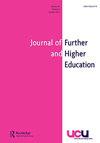Influencing factors of social entrepreneurship intentions in a higher education context
IF 2.4
Q1 EDUCATION & EDUCATIONAL RESEARCH
引用次数: 0
Abstract
ABSTRACT The teaching of entrepreneurship has been progressively included in the curricula of several university courses to stimulate the development of empowering attitudes and an entrepreneurial mentality. However, a new form of entrepreneurship has emerged with a focus on sustainability and the creation of new projects that aim to reduce social asymmetries and contribute to a fairer and more balanced society. The role of universities is also to foster the emergence of these projects through the implementation of practices aimed at fostering social entrepreneurship among students. This study aims to understand the determinant dimensions that characterise the students’ social entrepreneurial intention. For this purpose, a sample of 177 students attending a social entrepreneurship course in a higher education institution was employed. The findings indicate that individual, organisation, and context constructs are determinants of students’ entrepreneurial intention. However, not all organisational factors contribute equally. Mentoring and social networks are relevant elements for the entrepreneurial intention of individuals, while curriculum and critical pedagogy are not recognised as determinants.高等教育背景下社会创业意向的影响因素
创业教学已逐步纳入一些大学课程的课程,以刺激赋权态度和创业心态的发展。然而,一种新的创业形式已经出现,其重点是可持续性和创造新的项目,旨在减少社会不对称,为更公平、更平衡的社会做出贡献。大学的作用还在于通过实施旨在培养学生社会创业精神的实践,促进这些项目的出现。本研究旨在了解大学生社会创业意向的决定因素。为此,我们选取了177名在某高等教育机构参加社会创业课程的学生作为样本。研究结果表明,个人、组织和情境结构是学生创业意向的决定因素。然而,并不是所有的组织因素都起着同样的作用。指导和社会网络是个人创业意向的相关因素,而课程和批判性教学法不被认为是决定因素。
本文章由计算机程序翻译,如有差异,请以英文原文为准。
求助全文
约1分钟内获得全文
求助全文
来源期刊

JOURNAL OF FURTHER AND HIGHER EDUCATION
EDUCATION & EDUCATIONAL RESEARCH-
CiteScore
5.20
自引率
4.30%
发文量
80
期刊介绍:
Journal of Further and Higher Education is an international, peer-reviewed journal publishing scholarly work that represents the whole field of post-16 education and training. The journal engages with a diverse range of topics within the field including management and administration, teacher education and training, curriculum, staff and institutional development, and teaching and learning strategies and processes. Through encouraging engagement with and around policy, contemporary pedagogic issues and professional concerns within different educational systems around the globe, Journal of Further and Higher Education is committed to promoting excellence by providing a forum for scholarly debate and evaluation. Articles that are accepted for publication probe and offer original insights in an accessible, succinct style, and debate and critique practice, research, theory. They offer informed perspectives on contextual and professional matters and critically examine the relationship between theory and practice across the spectrum of further and higher education.
 求助内容:
求助内容: 应助结果提醒方式:
应助结果提醒方式:


